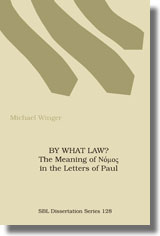
$30.00
“This 1990 Columbia University dissertation (R. Scroggs) uses linguistics theory to clarify Paul’s use of nomos. Winger analyzes patterns of usage to identify seven components that constitute the ‘meaning’ of nomos. His examination of ‘referents’ indicates, among other things, that Paul uses nomos most often to refer to Jewish nomos and that Paul has a ‘general category’ (86) of nomos in which Jewish nomos belongs. From its use within the Jewish community, Winger defines Jewish nomos as ‘what Jews do’ (109) rather than as any specific object (e.g., the Pentateuch). He tests this definition and the thesis that Paul uses his more general understanding of nomos to critique Jewish nomos by extended exegesis of Gal. 2:15–21 and Rom. 7:14–8:7.”
— Jerry L. Sumney, Religious Studies Review
“This is a fine dissertation. The seven chapters give the main lines of the argument; their clarity is enhanced by figures, summaries, paraphrases of the biblical text, and cross-referencing. The more technical issues are treated in appendixes to chaps. 1, 2, and 4. In general, W.’s case is convincing: it does indeed seem that ‘the secular meaning of nomos carries over to Paul’s religious discourse with the term, and helps to explain much that he says with it’ (p. xiii). Of course, the secular/religious distinction would have been much less obvious to Paul than it is to a twentieth-century lawyer from the United States. In effect, then, W. is suggesting that Paul typically uses nomos to mean something like ‘culture’ more than ‘law’ as we would normally understand it. If that is so, it is not surprising to find that, for Paul, Christ’s work is of an order different from that of nomos and at the same time is embroiled in it in the lives of Christians.”
— Patricia M. McDonald, Catholic Biblical Quarterly
